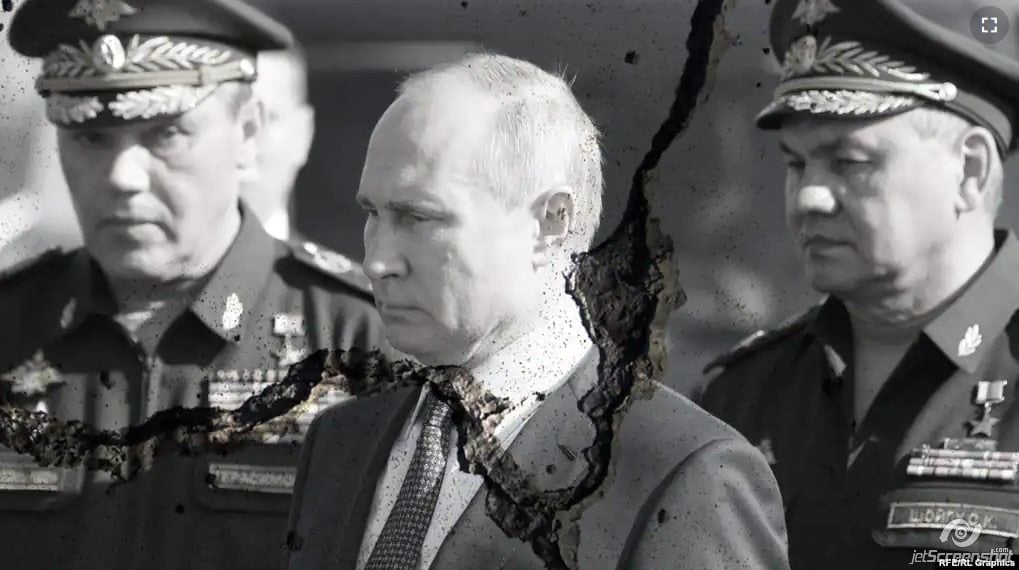By Kseniya Kirillova, for CEPA
Despite efforts to portray the Russian president’s confusion and helplessness in the face of the rebels as signs of strength and resilience, even pro-Kremlin Telegram channels have acknowledged the shock of Yevgeny Prigozhin’s mercenary mutiny.
Vadim Samodurov, the pro-regime head of the Agency for Strategic Communications, a private company, even described it on the Nezygar channel as a success. “A private military army effortlessly seized control of two Russian regions and rapidly advanced towards Moscow,” Samodurov wrote. He said negotiations with the “Kremlin’s mediator, who happened to be the head of a neighboring state [Aliaksandr Lukashenka]” were the only reason Wagner PMC halted its march on June 24. The events highlighted a complete failure of the system and “will have severe consequences for Russia’s state, legal and military apparatus.”
Dmitry Sevryukov, a pro-government journalist on the Telegram channel, observed that the “radical changes” suggested by the rebellion did not result in “rejection by citizens or incite them to defend the established order from unexpected armed intruders.” Sevryukov drew a comparison with the population’s reaction in 1991, “when the Soviet regime was collapsing, but few were willing to resist that change.”
Independent political analysts also argue that the rebellion showed Putin and his regime enjoy no more than passive support.
Those hoping for a change in the Kremlin might reflect that this is a positive development, signaling that propaganda myths about the unity between people and government are unfounded. And yet it should also be noted that despite calls from individual opposition leaders, no force emerged that was able to capitalize on the unrest. Neither the democratic opposition nor nationalist groups took advantage of the situation, and some who present themselves as opponents of the Kremlin even supported Putin.
While those opposition figures who remain in Russia are compelled, one way or another, to compromise with the Kremlin for their own safety, it’s apparent that some genuinely hold the view that it was the wrong time for a rebellion. This also applies to a number of opposition figures who have long lived abroad and carry the deep Russian instinct to regard supreme power and the state as sacred.
Putin has been remarkably successful in fostering this mentality. Over the course of his decades in power, the majority perceives him as an indispensable and untouchable figure.
Paradoxically, this phenomenon has also worked against him, as Russians have been conditioned not to engage in politics, fearing imprisonment, and to regard those in power as a privileged class of “celestial beings.” If power is sacred, independent of the people, and even celestial, it hardly needs to be protected by ordinary citizens. This instilled passivity and “learned helplessness” may have contributed to the lack of resistance to Prigozhin.
The aura of sanctity surrounding Putin also prevents rebellions or even questioning of his most egregious decisions. A survey conducted by independent sociologists from the Russian Field group in June found 73% of Russians believe their country is moving in the right direction. At the same time, 72% of respondents would approve of a peace agreement with Ukraine, and 64% would support a renewed assault on Kyiv.
This mess of contradictory opinions suggests a majority of people would endorse any decision made by the authorities on matters of war and peace. Such delegation of supreme power over life-and-death issues is a consequence of Putin’s sanctification.
But there are seeds of hope. Prominent Russian political scientist Vladimir Pastukhov argues the end of Putin’s reign will create opportunities for regime change as a whole because no successor will immediately possess the aura of sanctity the current head of state enjoys.
In this regard, Prigozhin has made a significant contribution to desanctifying Putin’s image. Not only did he expose the president’s helplessness to the world, he also publicly accused him of instigating a senseless war and losing it.
In doing so, the head of Wagner PMC unknowingly mapped a route to further dismantling Putin’s personality cult: defeat on the battlefield. It is now evident that such a defeat would provoke attacks on the Kremlin by “radical patriots” who enjoy considerable support from an active segment of the population.
Only increased military assistance to Ukraine can guarantee further frontline defeats for the Kremlin. This is crucial not only for the future of Ukraine and its neighboring states but for Russia as well.
By Kseniya Kirillova, for CEPA
Kseniya Kirillova is an analyst focused on Russian society, mentality, propaganda, and foreign policy. The author of numerous articles for the Jamestown Foundation, she has also written for the Atlantic Council, Stratfor, and others.
Europe’s Edge is CEPA’s online journal covering critical topics on the foreign policy docket across Europe and North America. All opinions are those of the author and do not necessarily represent the position or views of the institutions they represent or the Center for European Policy Analysis.





